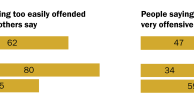In the survey, we asked Asian Americans about their views and experiences with another stereotype: Asians in the U.S. being a “model minority.” Asian adults were asked about their awareness of the label “model minority,” their views on whether the term is a good or bad thing, and their experiences with being treated in ways that reflect the stereotype.
What is the ‘model minority’ stereotype?
Amid the Civil Rights Movement in the 1960s, another narrative about Asian Americans became widespread: being characterized as a “model” minority. In 1966, two articles were published in The New York Times Magazine and U.S. News and World Report that portrayed Japanese and Chinese Americans as examples of successful minorities. Additionally, in 1987 Time magazine published a cover story on “those Asian American whiz kids.” The model minority stereotype has characterized the nation’s Asian population as high-achieving economically and educationally, which has been attributed to Asians being hardworking and deferential to parental and authority figures, among other factors. The stereotype generalizes Asians in the U.S. as intelligent, well-off, and able to excel in fields such as math and science. Additionally, the model minority myth positions Asian Americans in comparison with other non-White groups such as Black and Hispanic Americans.
For many Asians living in the United States, these characterizations do not align with their lived experiences or reflect their diverse socioeconomic backgrounds. Among Asian origin groups in the U.S., there are wide differences in economic and social experiences. Additionally, academic research has investigated how the pressures of the model minority stereotype can impact Asian Americans’ mental health and academic performance. Critics of the myth have also pointed to its impact on other racial and ethnic groups, especially Black Americans. Some argue that the myth has been used to minimize racial discrimination and justify policies that overlook the historical circumstances and impacts of colonialism, slavery and segregation on other non-White racial and ethnic groups.
Awareness of the term ‘model minority’
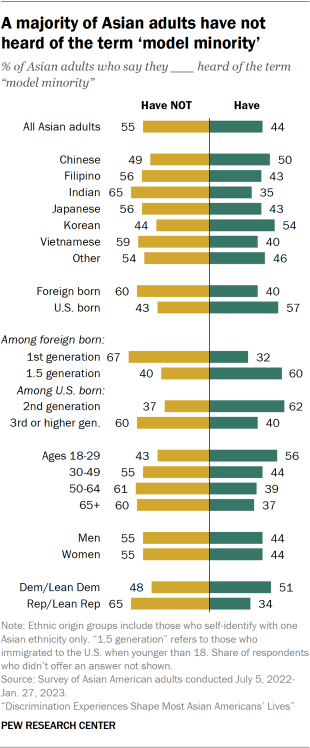
More than half of Asian adults (55%) say they have not heard of the term “model minority.” Just under half (44%) say they have heard of the term.
There are some differences in awareness of the term across demographic groups:
- Ethnic origin: About half of Korean and Chinese adults say they have heard of the term, while only about one-third of Indian adults say the same.
- Nativity: 57% of U.S.-born Asian adults have heard the term “model minority,” compared with 40% of immigrants.
- Immigrant generation: Among immigrants, 60% of those who came to the U.S. as children (“1.5 generation” in this report) say they have heard of the term “model minority,” compared with 32% of those who came to the U.S. as adults (first generation). And among U.S.-born Asian Americans, those who are second generation are more likely than those who are third or higher generation to say the same (62% vs. 40%).
- Age: 56% of Asian adults under 30 say they have heard of the term, compared with fewer than half among older Asian adults.
- Party: 51% of Asian adults who identify with or lean to the Democratic Party say they’ve heard the term, compared with 34% of those who identify with or lean to the Republican Party.
Awareness of the term ‘model minority’ varies across education and income
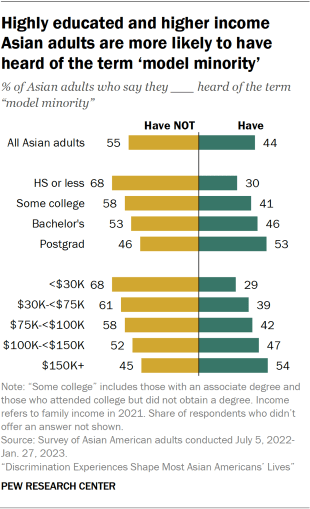
Asian adults with higher levels of formal education and higher family income are more likely to say they have heard of the term “model minority”:
- 53% of Asian adults with a postgraduate degree say they have heard the term, compared with smaller shares of those with a bachelor’s degree or less.
- 54% of Asian adults who make $150,000 or more say they have heard the term, higher than the shares among those with lower incomes. Among Asian Americans who make less than $30,000, only 29% say they have heard of the term “model minority.”
Notably, awareness of the term is higher among those born in the U.S. than immigrants across all levels of education and income.
Views of the term ‘model minority’
Among Asian adults who have heard of the term “model minority,” about four-in-ten say using it to describe Asians in the U.S. is a bad thing. Another 28% say using it is neither good nor bad, 17% say using it is a good thing, and 12% say they are not sure.
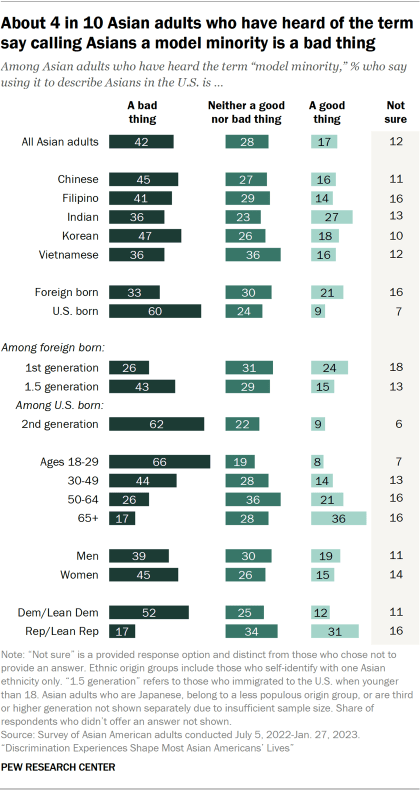
These views vary by ethnic origin, nativity, age and party. Among those who have heard of the term:
- Ethnic origin: Among Indian adults, the gap between those who say the term “model minority” is a bad thing and those who say it is a good thing (36% vs. 27%) is smaller than among other ethnic origin groups.
- Nativity: 60% of U.S.-born Asian adults say describing Asians as a model minority is a bad thing, while 9% say it is a good thing. Meanwhile, immigrants’ views of the model minority stereotype are more split (33% vs. 21%, respectively).
- Immigrant generation: Among immigrants, 43% of 1.5-generation Asian adults say using the term “model minority” is a bad thing, compared with 26% of first-generation Asian adults.
- Age: Asian adults under 30 are far more likely to say the model minority label is a bad thing than a good thing (66% vs. 8%). Meanwhile, Asian adults 65 and older are more likely to say describing Asian Americans as a model minority is a good thing (36%) than a bad thing (17%).
- Party: 52% of Asian Democrats say describing Asians as a model minority is a bad thing, about three times the share of Asian Republicans who say the same (17%).
Among those who know the term “model minority,” views of whether using it to describe Asians in the U.S. is a good or bad thing does not vary significantly across education levels. By income, Asian adults who make less than $30,000 are somewhat less likely to say it is a bad thing than those with higher incomes.18
Views of the ‘model minority’ label are linked to perceptions of the American dream
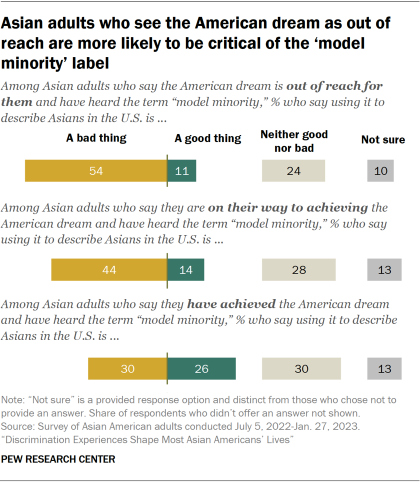
In the survey, we asked Asian Americans if they believe they have achieved the American dream, are on their way to achieving it, or if they believe the American dream is out of their reach. Among those who have heard of the term “model minority”:
- 54% of Asian adults who believe the American dream is out of their reach say describing Asian Americans as a model minority is a bad thing. This is higher than the shares among those who believe they are on their way to achieving (44%) or believe they have already achieved the American dream (30%).
- Meanwhile, 26% of Asian adults who believe they have achieved the American dream say the model minority label is a good thing. In comparison, 14% of those who believe they are on their way to achieving the American dream and 11% of those who believe that the American dream is out of their reach say the same.
How knowledge of Asian American history impacts awareness and views of the ‘model minority’ label
In this survey, we asked Asian Americans how informed they are about the history of Asians in the U.S.
Whether Asian adults have heard of the model minority label is linked to their knowledge of Asian American history:
- 62% of Asian adults who are extremely or very informed of U.S. Asian history have heard of the term “model minority.”
- Smaller shares of those who are somewhat informed (44%) or a little or not at all informed (29%) about U.S. Asian history say they are aware of the term.
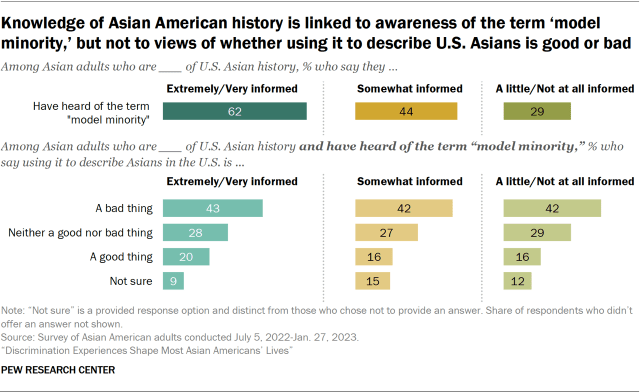
However, among those who have heard of the “model minority” label, views on whether using it to describe Asian Americans is good or bad are similar regardless of how informed they are on Asian American history. About four-in-ten across knowledge levels say describing Asian Americans as a model minority is a bad thing.
Most Asian Americans have experienced ‘model minority’ stereotypes
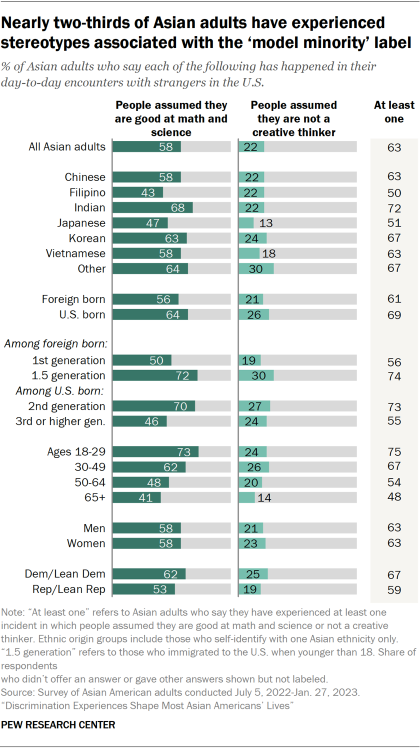
The model minority stereotype often paints Asian Americans as intellectually and financially successful, deferential to authority, and competent but robotic or unemotional, especially in comparison with other racial and ethnic groups. Additionally, some stereotypes associated with the model minority characterize Asian Americans as successful in fields such as math and science, as well as lacking in creativity.
Nearly two-thirds of Asian adults (63%) say that in their day-to-day encounters with strangers, they have at least one experience in which someone assumed they are good at math and science or not a creative thinker.
Broadly, Asian adults are far more likely to say someone has assumed they are good at math and science (58%) than not a creative thinker (22%).
Across these experiences, there are some differences by demographic groups:
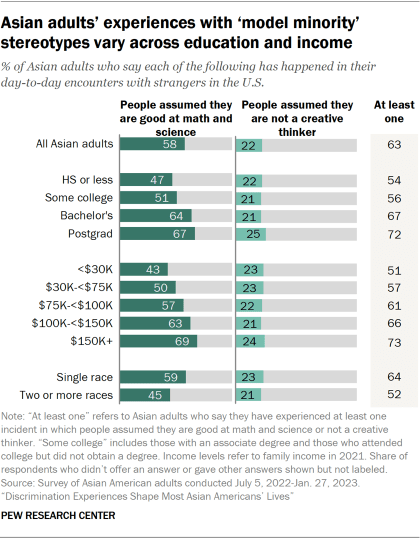
- Ethnic origin: 68% of Indian adults say strangers have assumed they are good at math and science, a higher share than among most other origin groups. Meanwhile, about half or fewer of Japanese (47%) and Filipino (43%) adults say people have made this assumption about them.
- Immigrant generation: About seven-in-ten Asian adults who are 1.5 generation and second generation each say people have assumed they are good at math and science, compared with 50% among the first generation and 46% among third or higher generations.
- Education: About two-thirds of Asian adults with a postgraduate degree or a bachelor’s degree say strangers have assumed they are good at math and science, compared with roughly half of those with some college experience or less. Similar shares regardless of education say people have assumed they are not a creative thinker.
- Income: 69% of those who make $150,000 or more say strangers have assumed they are good at math and science, compared with 43% of those who make less than $30,000.
- Race: 59% of single-race Asian adults (those who identify as Asian and no other race) say someone assumed they are good at math and science, compared with 45% of Asian adults who identify with two or more races (those who identify as Asian and at least one other race).
In their own words: Asian Americans’ experiences with the ‘model minority’ stereotype
In our 2021 focus groups of Asian Americans, participants talked about their views of and experiences with the “model minority” stereotype.
Many U.S.-born Asian participants shared how it has been harmful, with some discussing the social pressures associated with it. Others spoke about how the stereotype portrays Asians as monolithic and compares them with other racial and ethnic groups.
“You have to be polished. There’s no room for failure. There’s no room for imperfections. You have to be well-spoken, well-educated, have the right opinions, be good-looking, be tall. [You] have to have a family structure. There’s no room for any sort of freedom in identity except for the mold that you’ve been painted as – as a model citizen.”
–U.S.-born man of Pakistani origin in early 30s
“As an Asian person, I feel like there’s a stereotype that Asian students are high achievers academically. They’re good at math and science. … I was a pretty mediocre student, and math and science were actually my weakest subjects, so I feel like it’s either way you lose. Teachers expect you to fit a certain stereotype and if you’re not, then you’re a disappointment, but at the same time, even if you are good at math and science, that just means that you’re fitting a stereotype. It’s [actually] your own achievement, but your teachers might think ‘Oh, it’s because they’re Asian,’ and that diminishes your achievement.”
–U.S.-born woman of Korean origin in late 20s
“The model minority myth … mak[es] us as Asians [and] South Asians monoliths. … I’ve had people go, ‘Oh, so your dad’s a doctor? Is he a lawyer? Do you have money? Do you have this? Do you have that? Are you [in] an arranged marriage?’ And just the kind of image that portrays and gives us. But the expectations put on us as being high performing and everyone assumes you’re going to be smart. … I am a black sheep in many ways, not only within my family, but within Asian [and] South Asian culture, being [in my profession], someone who’s not a doctor, who hasn’t gone the professional, traditional, educational route. So, it’s very harmful, that too, for those communities within the Asian diaspora who have come to the United States. … [M]any of them come from impoverished and underrepresented communities and the expectations put on them to produce or the types of jobs and menial labor they have to take on as a result is really a very poisonous mythos to have out there.”
–U.S.-born woman of Indian origin in early 40s
“One of the reasons the model minority fallacy works so well as an argument against affirmative action [for Indians is] they are a newer immigrant group that has come here and … [t]here’s a lot of education [in India]. People have opportunity there that then they can come [to America] and continue with those connections. Whereas Blacks and Hispanics have had generations of oppression, so they don’t have anything to build off of. So when you bucket everybody – Black, Hispanics and Asians – into one group, then you can make those arguments of, ‘Oh, [Asians] are the model minority, they can do it.’”
–U.S.-born woman of Indian origin in early 40s
Some participants talked about having mixed feelings about being called the “model minority” and how they felt like it put them in a kind of “middle ground.”
“I feel like Asians are kind of known as the model minority. That kind of puts us in an interesting position where I feel like we’re supposed to excel and succeed in the media, or we’re seen in the media as exceeding in all these things as smart. All of us are not by any means. Yeah, I feel like we’re in this weird middle ground.”
–U.S.-born man of Chinese origin in early 20s
“A lot of people believe that Japanese are the most humble and honest people, even among other Asians. I feel like I need to live up to that. I have to try hard when people say things like that. Of course, it is good, but it’s a lot of work sometimes. As Japanese, and for my family, I try hard.”
–Immigrant man of Japanese origin in mid-40s (translated from Japanese)
Others had more positive impressions of the model minority label, saying it made them proud to be Asian and have others see them that way:
“Whenever I apply for any job, in the drop-down there is an option to choose the ethnicity, and I write Asian American proudly because everyone knows us Asians as hardworking, they recognize us as loyal and hardworking.”
–Immigrant woman of Nepalese origin in mid-40s (translated from Nepali)
“I think any model is a good thing. I mean the cognitive, the word ‘model,’ when you model after somebody it’s a positive meaning to it. So personally for me I have no issues with being called the model minority because it only tells me that I’m doing something right.”
–U.S.-born man of Hmong origin in early 40s

